Analysis of Organizational Learning and Development Strategies
VerifiedAdded on 2023/01/12
|12
|3333
|88
Report
AI Summary
This report delves into the critical evaluation of organizational learning versus learning organizations, highlighting key differences in their definitions, objectives, and functions. It emphasizes the importance of organizational learning and development, outlining benefits such as knowledge creation, increased employee satisfaction, enhanced productivity, and the development of leaders. The report further explores the application of various learning theories, including experiential learning and social learning, and discusses relevant models, such as the goal-oriented model. By examining these aspects, the report provides a comprehensive overview of how organizations can foster a culture of continuous learning and development to achieve sustained success in a competitive market.
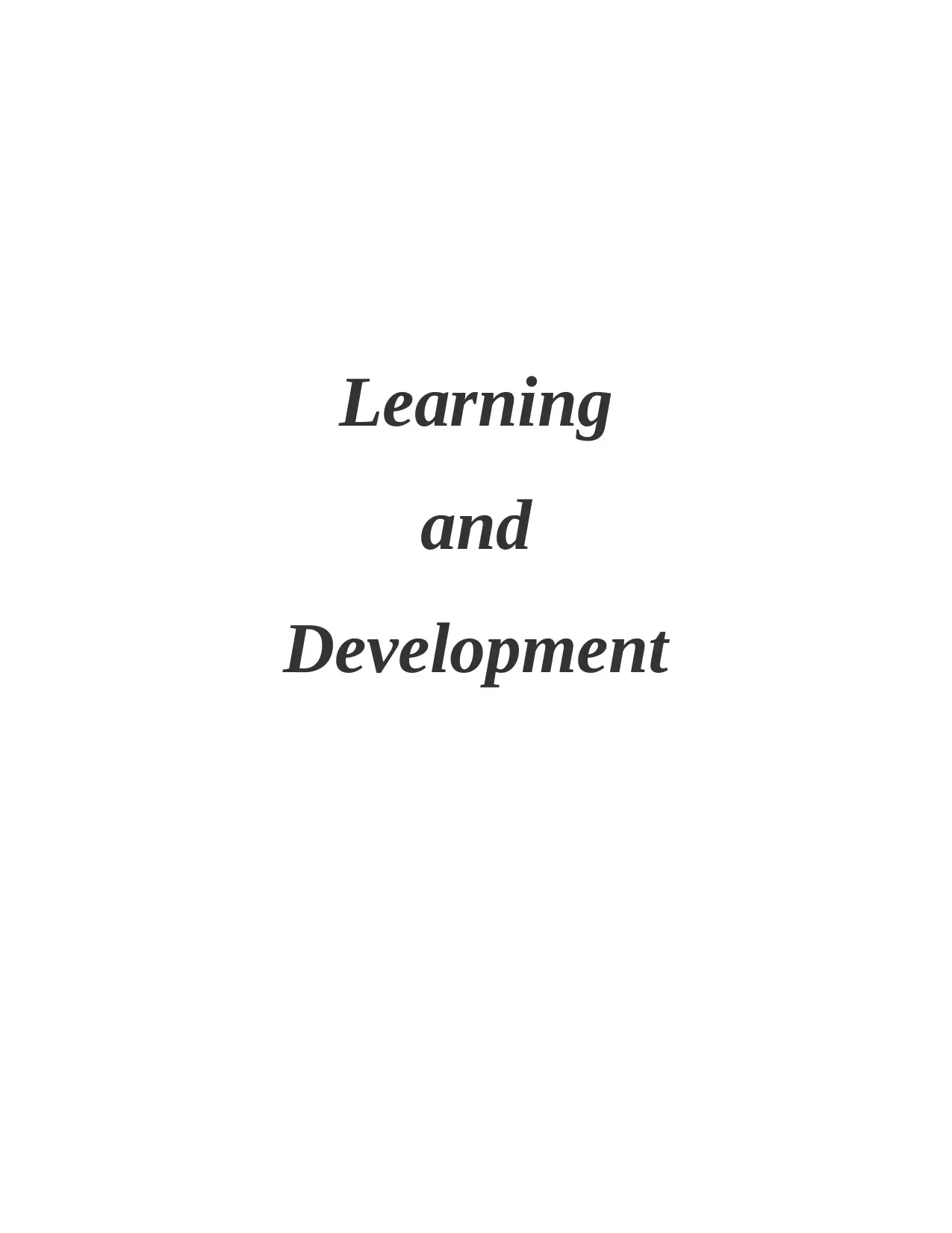
Learning
and
Development
and
Development
Paraphrase This Document
Need a fresh take? Get an instant paraphrase of this document with our AI Paraphraser
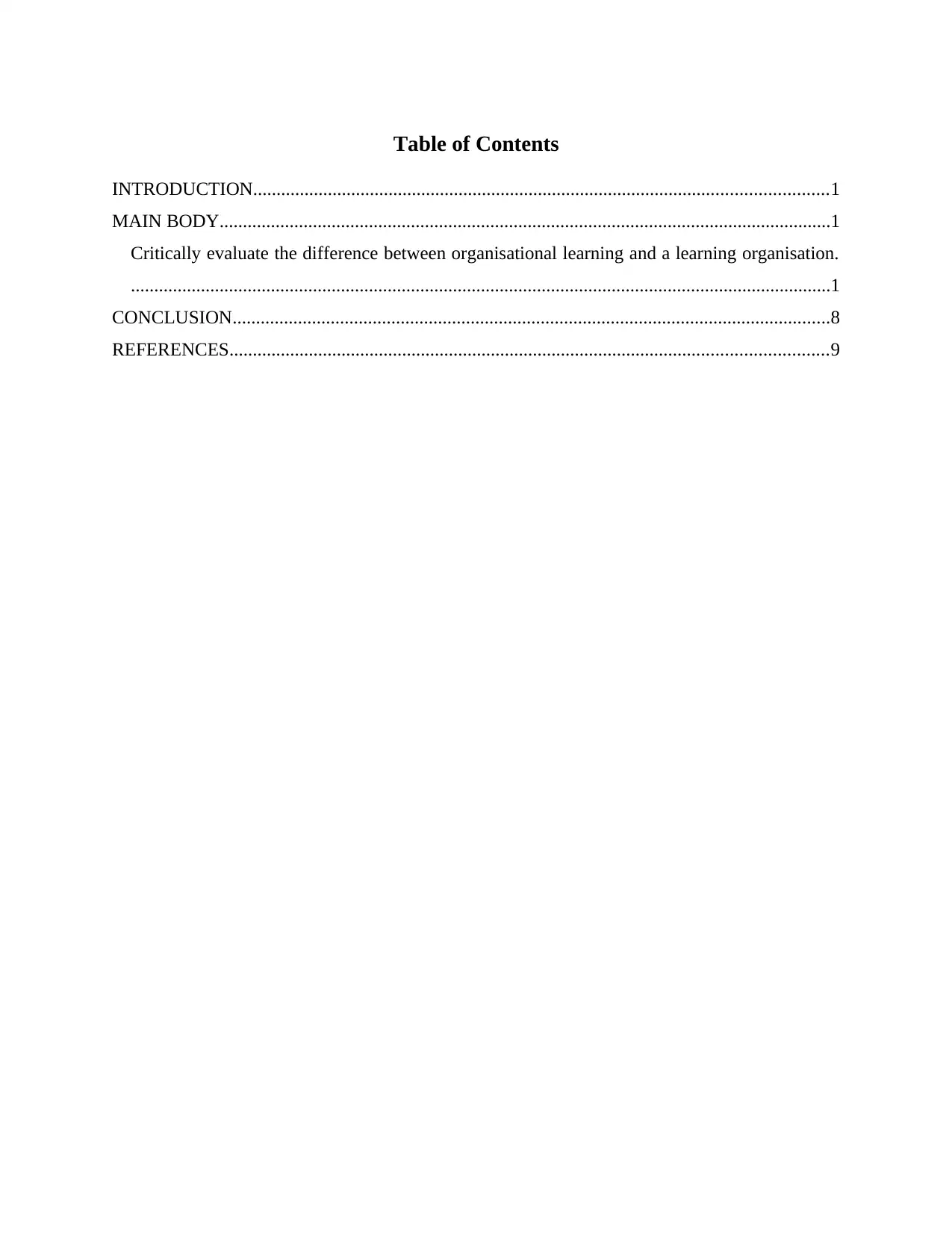
Table of Contents
INTRODUCTION...........................................................................................................................1
MAIN BODY...................................................................................................................................1
Critically evaluate the difference between organisational learning and a learning organisation.
......................................................................................................................................................1
CONCLUSION................................................................................................................................8
REFERENCES................................................................................................................................9
INTRODUCTION...........................................................................................................................1
MAIN BODY...................................................................................................................................1
Critically evaluate the difference between organisational learning and a learning organisation.
......................................................................................................................................................1
CONCLUSION................................................................................................................................8
REFERENCES................................................................................................................................9
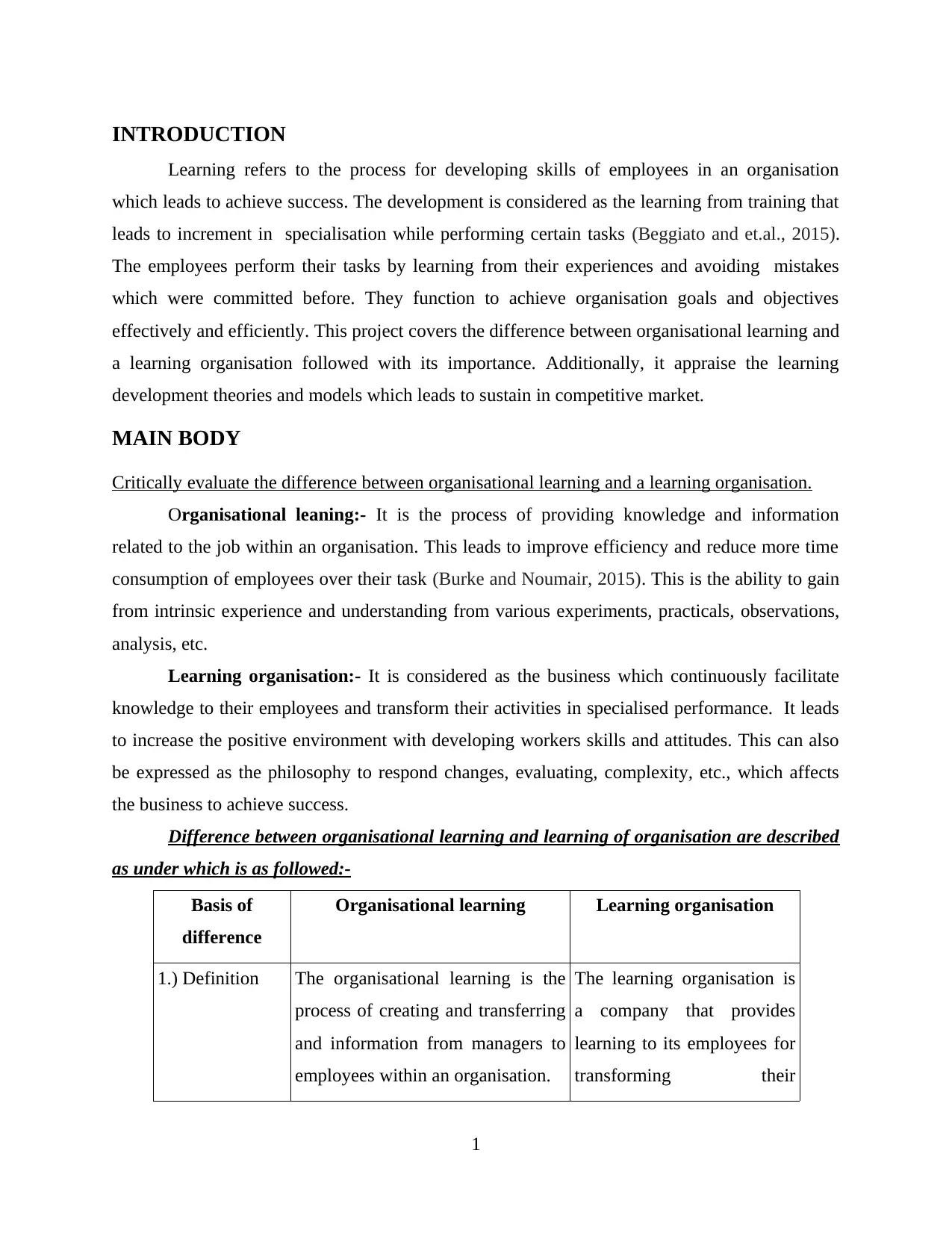
INTRODUCTION
Learning refers to the process for developing skills of employees in an organisation
which leads to achieve success. The development is considered as the learning from training that
leads to increment in specialisation while performing certain tasks (Beggiato and et.al., 2015).
The employees perform their tasks by learning from their experiences and avoiding mistakes
which were committed before. They function to achieve organisation goals and objectives
effectively and efficiently. This project covers the difference between organisational learning and
a learning organisation followed with its importance. Additionally, it appraise the learning
development theories and models which leads to sustain in competitive market.
MAIN BODY
Critically evaluate the difference between organisational learning and a learning organisation.
Organisational leaning:- It is the process of providing knowledge and information
related to the job within an organisation. This leads to improve efficiency and reduce more time
consumption of employees over their task (Burke and Noumair, 2015). This is the ability to gain
from intrinsic experience and understanding from various experiments, practicals, observations,
analysis, etc.
Learning organisation:- It is considered as the business which continuously facilitate
knowledge to their employees and transform their activities in specialised performance. It leads
to increase the positive environment with developing workers skills and attitudes. This can also
be expressed as the philosophy to respond changes, evaluating, complexity, etc., which affects
the business to achieve success.
Difference between organisational learning and learning of organisation are described
as under which is as followed:-
Basis of
difference
Organisational learning Learning organisation
1.) Definition The organisational learning is the
process of creating and transferring
and information from managers to
employees within an organisation.
The learning organisation is
a company that provides
learning to its employees for
transforming their
1
Learning refers to the process for developing skills of employees in an organisation
which leads to achieve success. The development is considered as the learning from training that
leads to increment in specialisation while performing certain tasks (Beggiato and et.al., 2015).
The employees perform their tasks by learning from their experiences and avoiding mistakes
which were committed before. They function to achieve organisation goals and objectives
effectively and efficiently. This project covers the difference between organisational learning and
a learning organisation followed with its importance. Additionally, it appraise the learning
development theories and models which leads to sustain in competitive market.
MAIN BODY
Critically evaluate the difference between organisational learning and a learning organisation.
Organisational leaning:- It is the process of providing knowledge and information
related to the job within an organisation. This leads to improve efficiency and reduce more time
consumption of employees over their task (Burke and Noumair, 2015). This is the ability to gain
from intrinsic experience and understanding from various experiments, practicals, observations,
analysis, etc.
Learning organisation:- It is considered as the business which continuously facilitate
knowledge to their employees and transform their activities in specialised performance. It leads
to increase the positive environment with developing workers skills and attitudes. This can also
be expressed as the philosophy to respond changes, evaluating, complexity, etc., which affects
the business to achieve success.
Difference between organisational learning and learning of organisation are described
as under which is as followed:-
Basis of
difference
Organisational learning Learning organisation
1.) Definition The organisational learning is the
process of creating and transferring
and information from managers to
employees within an organisation.
The learning organisation is
a company that provides
learning to its employees for
transforming their
1
⊘ This is a preview!⊘
Do you want full access?
Subscribe today to unlock all pages.

Trusted by 1+ million students worldwide
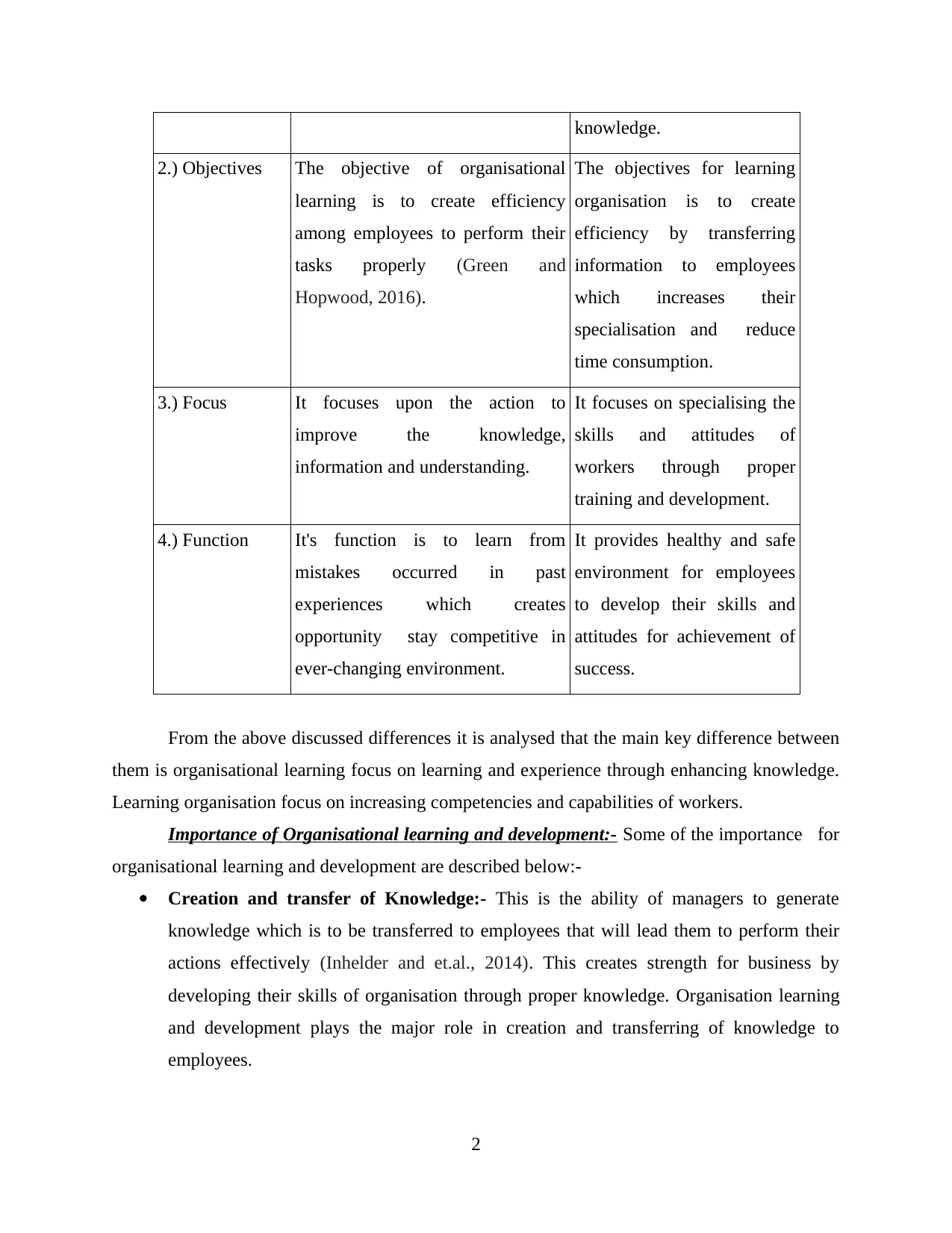
knowledge.
2.) Objectives The objective of organisational
learning is to create efficiency
among employees to perform their
tasks properly (Green and
Hopwood, 2016).
The objectives for learning
organisation is to create
efficiency by transferring
information to employees
which increases their
specialisation and reduce
time consumption.
3.) Focus It focuses upon the action to
improve the knowledge,
information and understanding.
It focuses on specialising the
skills and attitudes of
workers through proper
training and development.
4.) Function It's function is to learn from
mistakes occurred in past
experiences which creates
opportunity stay competitive in
ever-changing environment.
It provides healthy and safe
environment for employees
to develop their skills and
attitudes for achievement of
success.
From the above discussed differences it is analysed that the main key difference between
them is organisational learning focus on learning and experience through enhancing knowledge.
Learning organisation focus on increasing competencies and capabilities of workers.
Importance of Organisational learning and development:- Some of the importance for
organisational learning and development are described below:-
Creation and transfer of Knowledge:- This is the ability of managers to generate
knowledge which is to be transferred to employees that will lead them to perform their
actions effectively (Inhelder and et.al., 2014). This creates strength for business by
developing their skills of organisation through proper knowledge. Organisation learning
and development plays the major role in creation and transferring of knowledge to
employees.
2
2.) Objectives The objective of organisational
learning is to create efficiency
among employees to perform their
tasks properly (Green and
Hopwood, 2016).
The objectives for learning
organisation is to create
efficiency by transferring
information to employees
which increases their
specialisation and reduce
time consumption.
3.) Focus It focuses upon the action to
improve the knowledge,
information and understanding.
It focuses on specialising the
skills and attitudes of
workers through proper
training and development.
4.) Function It's function is to learn from
mistakes occurred in past
experiences which creates
opportunity stay competitive in
ever-changing environment.
It provides healthy and safe
environment for employees
to develop their skills and
attitudes for achievement of
success.
From the above discussed differences it is analysed that the main key difference between
them is organisational learning focus on learning and experience through enhancing knowledge.
Learning organisation focus on increasing competencies and capabilities of workers.
Importance of Organisational learning and development:- Some of the importance for
organisational learning and development are described below:-
Creation and transfer of Knowledge:- This is the ability of managers to generate
knowledge which is to be transferred to employees that will lead them to perform their
actions effectively (Inhelder and et.al., 2014). This creates strength for business by
developing their skills of organisation through proper knowledge. Organisation learning
and development plays the major role in creation and transferring of knowledge to
employees.
2
Paraphrase This Document
Need a fresh take? Get an instant paraphrase of this document with our AI Paraphraser
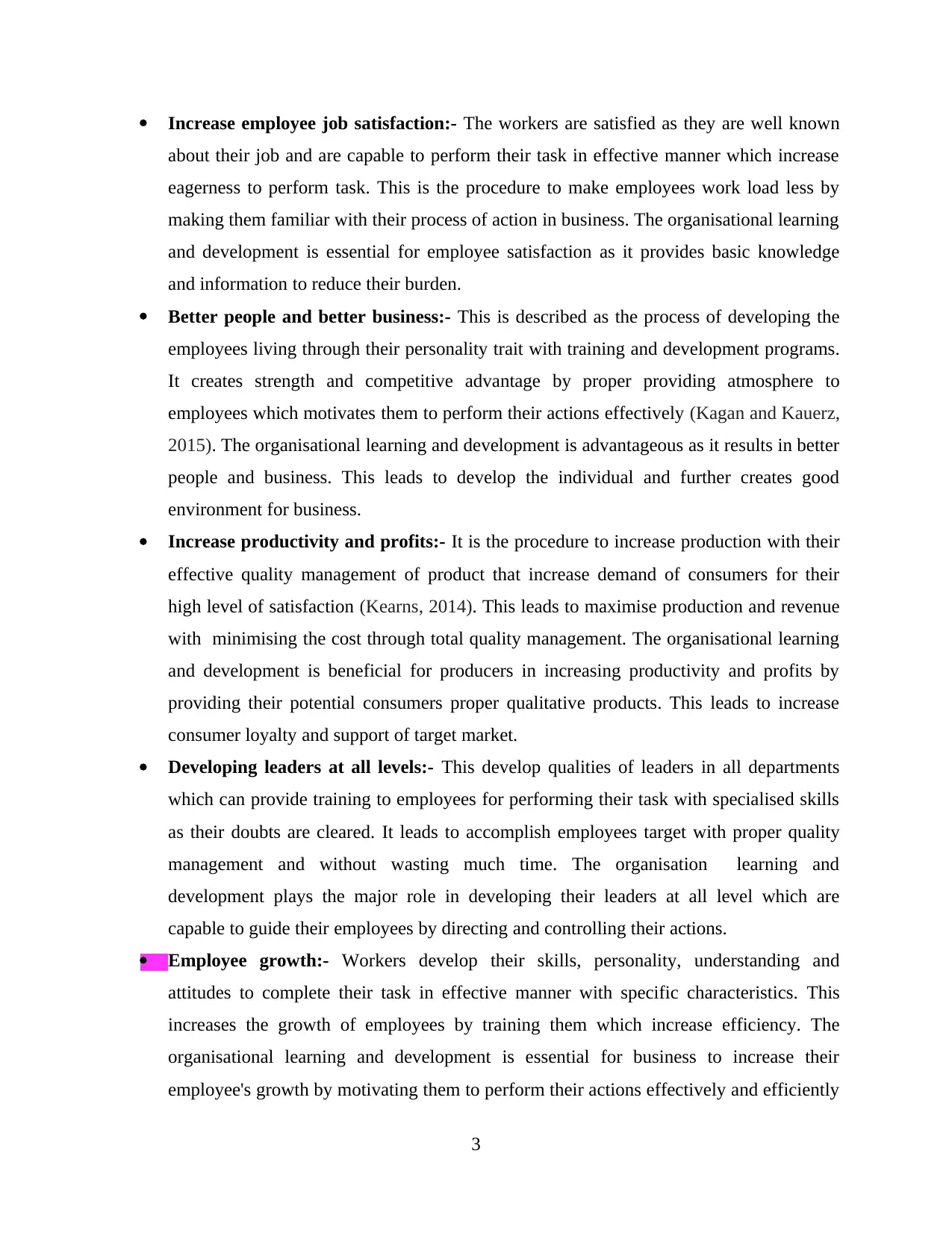
Increase employee job satisfaction:- The workers are satisfied as they are well known
about their job and are capable to perform their task in effective manner which increase
eagerness to perform task. This is the procedure to make employees work load less by
making them familiar with their process of action in business. The organisational learning
and development is essential for employee satisfaction as it provides basic knowledge
and information to reduce their burden.
Better people and better business:- This is described as the process of developing the
employees living through their personality trait with training and development programs.
It creates strength and competitive advantage by proper providing atmosphere to
employees which motivates them to perform their actions effectively (Kagan and Kauerz,
2015). The organisational learning and development is advantageous as it results in better
people and business. This leads to develop the individual and further creates good
environment for business.
Increase productivity and profits:- It is the procedure to increase production with their
effective quality management of product that increase demand of consumers for their
high level of satisfaction (Kearns, 2014). This leads to maximise production and revenue
with minimising the cost through total quality management. The organisational learning
and development is beneficial for producers in increasing productivity and profits by
providing their potential consumers proper qualitative products. This leads to increase
consumer loyalty and support of target market.
Developing leaders at all levels:- This develop qualities of leaders in all departments
which can provide training to employees for performing their task with specialised skills
as their doubts are cleared. It leads to accomplish employees target with proper quality
management and without wasting much time. The organisation learning and
development plays the major role in developing their leaders at all level which are
capable to guide their employees by directing and controlling their actions.
Employee growth:- Workers develop their skills, personality, understanding and
attitudes to complete their task in effective manner with specific characteristics. This
increases the growth of employees by training them which increase efficiency. The
organisational learning and development is essential for business to increase their
employee's growth by motivating them to perform their actions effectively and efficiently
3
about their job and are capable to perform their task in effective manner which increase
eagerness to perform task. This is the procedure to make employees work load less by
making them familiar with their process of action in business. The organisational learning
and development is essential for employee satisfaction as it provides basic knowledge
and information to reduce their burden.
Better people and better business:- This is described as the process of developing the
employees living through their personality trait with training and development programs.
It creates strength and competitive advantage by proper providing atmosphere to
employees which motivates them to perform their actions effectively (Kagan and Kauerz,
2015). The organisational learning and development is advantageous as it results in better
people and business. This leads to develop the individual and further creates good
environment for business.
Increase productivity and profits:- It is the procedure to increase production with their
effective quality management of product that increase demand of consumers for their
high level of satisfaction (Kearns, 2014). This leads to maximise production and revenue
with minimising the cost through total quality management. The organisational learning
and development is beneficial for producers in increasing productivity and profits by
providing their potential consumers proper qualitative products. This leads to increase
consumer loyalty and support of target market.
Developing leaders at all levels:- This develop qualities of leaders in all departments
which can provide training to employees for performing their task with specialised skills
as their doubts are cleared. It leads to accomplish employees target with proper quality
management and without wasting much time. The organisation learning and
development plays the major role in developing their leaders at all level which are
capable to guide their employees by directing and controlling their actions.
Employee growth:- Workers develop their skills, personality, understanding and
attitudes to complete their task in effective manner with specific characteristics. This
increases the growth of employees by training them which increase efficiency. The
organisational learning and development is essential for business to increase their
employee's growth by motivating them to perform their actions effectively and efficiently
3
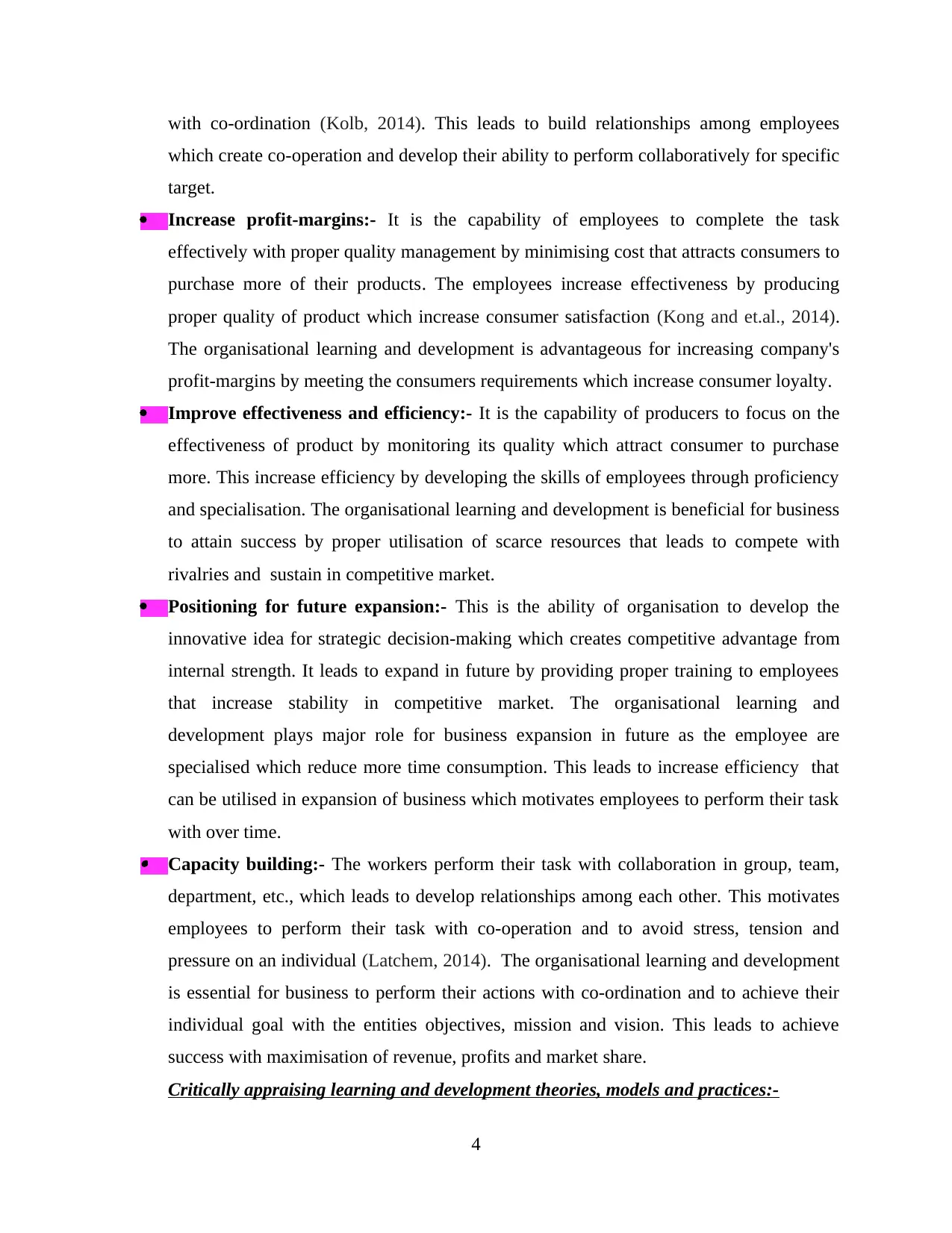
with co-ordination (Kolb, 2014). This leads to build relationships among employees
which create co-operation and develop their ability to perform collaboratively for specific
target.
Increase profit-margins:- It is the capability of employees to complete the task
effectively with proper quality management by minimising cost that attracts consumers to
purchase more of their products. The employees increase effectiveness by producing
proper quality of product which increase consumer satisfaction (Kong and et.al., 2014).
The organisational learning and development is advantageous for increasing company's
profit-margins by meeting the consumers requirements which increase consumer loyalty.
Improve effectiveness and efficiency:- It is the capability of producers to focus on the
effectiveness of product by monitoring its quality which attract consumer to purchase
more. This increase efficiency by developing the skills of employees through proficiency
and specialisation. The organisational learning and development is beneficial for business
to attain success by proper utilisation of scarce resources that leads to compete with
rivalries and sustain in competitive market.
Positioning for future expansion:- This is the ability of organisation to develop the
innovative idea for strategic decision-making which creates competitive advantage from
internal strength. It leads to expand in future by providing proper training to employees
that increase stability in competitive market. The organisational learning and
development plays major role for business expansion in future as the employee are
specialised which reduce more time consumption. This leads to increase efficiency that
can be utilised in expansion of business which motivates employees to perform their task
with over time. Capacity building:- The workers perform their task with collaboration in group, team,
department, etc., which leads to develop relationships among each other. This motivates
employees to perform their task with co-operation and to avoid stress, tension and
pressure on an individual (Latchem, 2014). The organisational learning and development
is essential for business to perform their actions with co-ordination and to achieve their
individual goal with the entities objectives, mission and vision. This leads to achieve
success with maximisation of revenue, profits and market share.
Critically appraising learning and development theories, models and practices:-
4
which create co-operation and develop their ability to perform collaboratively for specific
target.
Increase profit-margins:- It is the capability of employees to complete the task
effectively with proper quality management by minimising cost that attracts consumers to
purchase more of their products. The employees increase effectiveness by producing
proper quality of product which increase consumer satisfaction (Kong and et.al., 2014).
The organisational learning and development is advantageous for increasing company's
profit-margins by meeting the consumers requirements which increase consumer loyalty.
Improve effectiveness and efficiency:- It is the capability of producers to focus on the
effectiveness of product by monitoring its quality which attract consumer to purchase
more. This increase efficiency by developing the skills of employees through proficiency
and specialisation. The organisational learning and development is beneficial for business
to attain success by proper utilisation of scarce resources that leads to compete with
rivalries and sustain in competitive market.
Positioning for future expansion:- This is the ability of organisation to develop the
innovative idea for strategic decision-making which creates competitive advantage from
internal strength. It leads to expand in future by providing proper training to employees
that increase stability in competitive market. The organisational learning and
development plays major role for business expansion in future as the employee are
specialised which reduce more time consumption. This leads to increase efficiency that
can be utilised in expansion of business which motivates employees to perform their task
with over time. Capacity building:- The workers perform their task with collaboration in group, team,
department, etc., which leads to develop relationships among each other. This motivates
employees to perform their task with co-operation and to avoid stress, tension and
pressure on an individual (Latchem, 2014). The organisational learning and development
is essential for business to perform their actions with co-ordination and to achieve their
individual goal with the entities objectives, mission and vision. This leads to achieve
success with maximisation of revenue, profits and market share.
Critically appraising learning and development theories, models and practices:-
4
⊘ This is a preview!⊘
Do you want full access?
Subscribe today to unlock all pages.

Trusted by 1+ million students worldwide
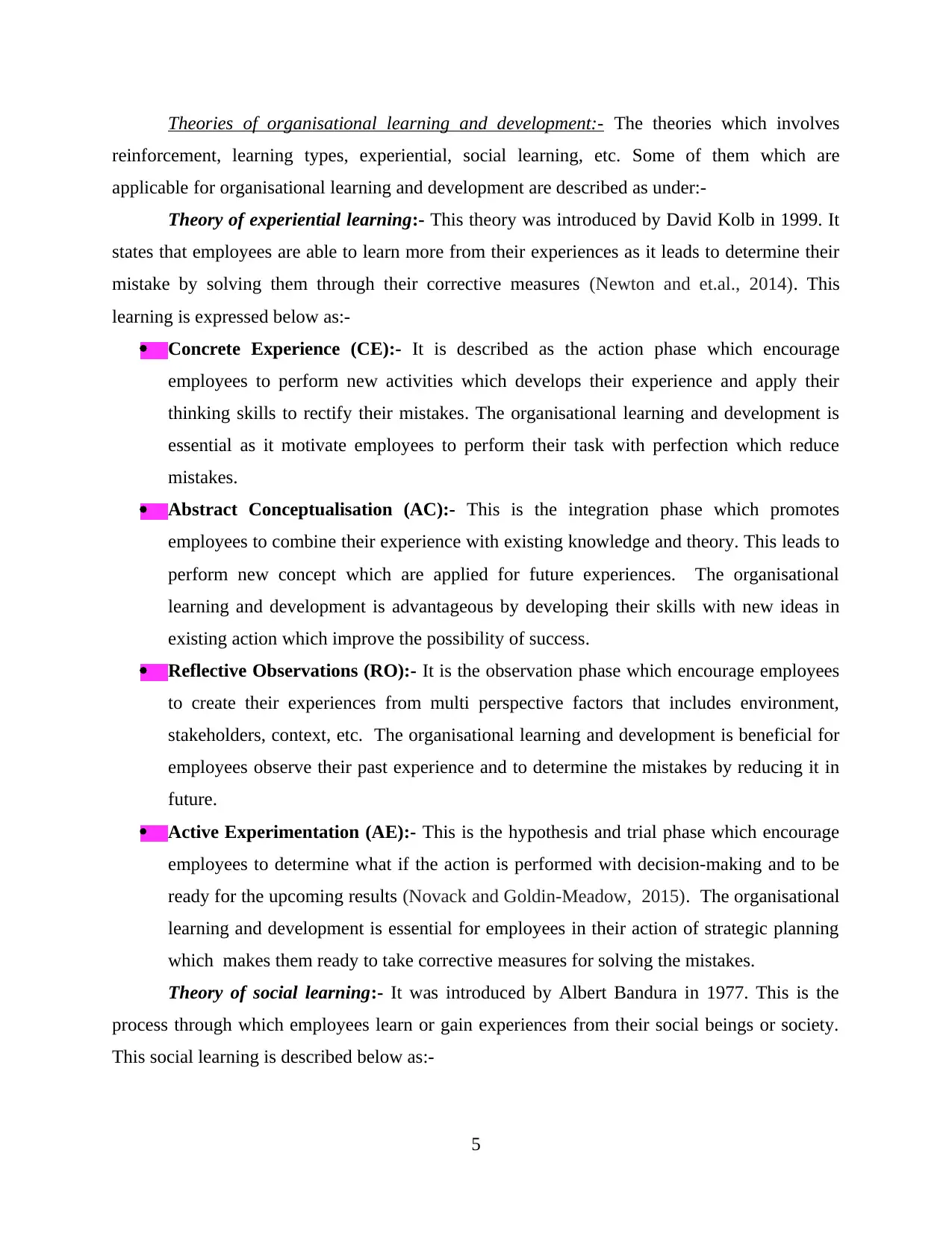
Theories of organisational learning and development:- The theories which involves
reinforcement, learning types, experiential, social learning, etc. Some of them which are
applicable for organisational learning and development are described as under:-
Theory of experiential learning:- This theory was introduced by David Kolb in 1999. It
states that employees are able to learn more from their experiences as it leads to determine their
mistake by solving them through their corrective measures (Newton and et.al., 2014). This
learning is expressed below as:-
Concrete Experience (CE):- It is described as the action phase which encourage
employees to perform new activities which develops their experience and apply their
thinking skills to rectify their mistakes. The organisational learning and development is
essential as it motivate employees to perform their task with perfection which reduce
mistakes.
Abstract Conceptualisation (AC):- This is the integration phase which promotes
employees to combine their experience with existing knowledge and theory. This leads to
perform new concept which are applied for future experiences. The organisational
learning and development is advantageous by developing their skills with new ideas in
existing action which improve the possibility of success.
Reflective Observations (RO):- It is the observation phase which encourage employees
to create their experiences from multi perspective factors that includes environment,
stakeholders, context, etc. The organisational learning and development is beneficial for
employees observe their past experience and to determine the mistakes by reducing it in
future.
Active Experimentation (AE):- This is the hypothesis and trial phase which encourage
employees to determine what if the action is performed with decision-making and to be
ready for the upcoming results (Novack and Goldin-Meadow, 2015). The organisational
learning and development is essential for employees in their action of strategic planning
which makes them ready to take corrective measures for solving the mistakes.
Theory of social learning:- It was introduced by Albert Bandura in 1977. This is the
process through which employees learn or gain experiences from their social beings or society.
This social learning is described below as:-
5
reinforcement, learning types, experiential, social learning, etc. Some of them which are
applicable for organisational learning and development are described as under:-
Theory of experiential learning:- This theory was introduced by David Kolb in 1999. It
states that employees are able to learn more from their experiences as it leads to determine their
mistake by solving them through their corrective measures (Newton and et.al., 2014). This
learning is expressed below as:-
Concrete Experience (CE):- It is described as the action phase which encourage
employees to perform new activities which develops their experience and apply their
thinking skills to rectify their mistakes. The organisational learning and development is
essential as it motivate employees to perform their task with perfection which reduce
mistakes.
Abstract Conceptualisation (AC):- This is the integration phase which promotes
employees to combine their experience with existing knowledge and theory. This leads to
perform new concept which are applied for future experiences. The organisational
learning and development is advantageous by developing their skills with new ideas in
existing action which improve the possibility of success.
Reflective Observations (RO):- It is the observation phase which encourage employees
to create their experiences from multi perspective factors that includes environment,
stakeholders, context, etc. The organisational learning and development is beneficial for
employees observe their past experience and to determine the mistakes by reducing it in
future.
Active Experimentation (AE):- This is the hypothesis and trial phase which encourage
employees to determine what if the action is performed with decision-making and to be
ready for the upcoming results (Novack and Goldin-Meadow, 2015). The organisational
learning and development is essential for employees in their action of strategic planning
which makes them ready to take corrective measures for solving the mistakes.
Theory of social learning:- It was introduced by Albert Bandura in 1977. This is the
process through which employees learn or gain experiences from their social beings or society.
This social learning is described below as:-
5
Paraphrase This Document
Need a fresh take? Get an instant paraphrase of this document with our AI Paraphraser
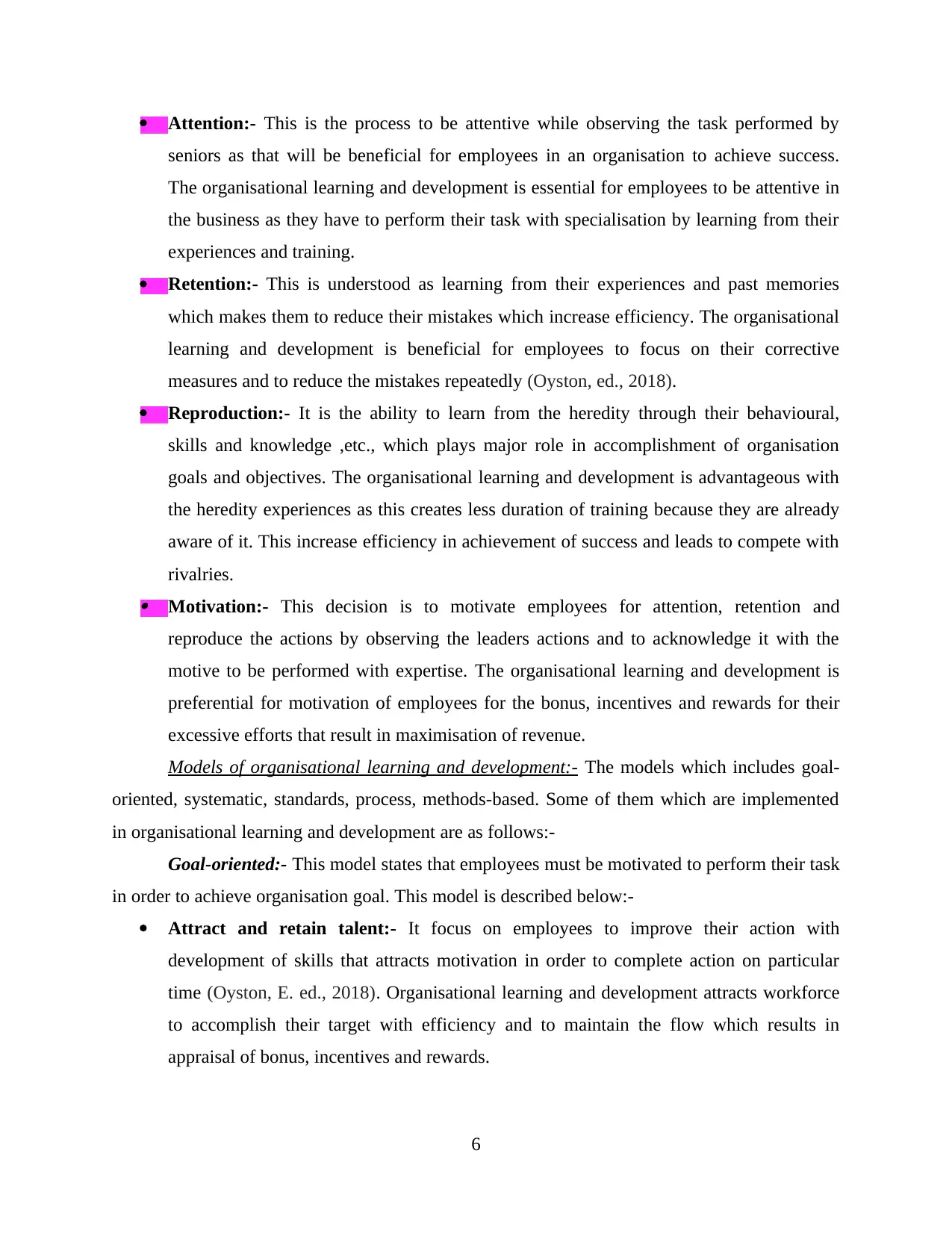
Attention:- This is the process to be attentive while observing the task performed by
seniors as that will be beneficial for employees in an organisation to achieve success.
The organisational learning and development is essential for employees to be attentive in
the business as they have to perform their task with specialisation by learning from their
experiences and training.
Retention:- This is understood as learning from their experiences and past memories
which makes them to reduce their mistakes which increase efficiency. The organisational
learning and development is beneficial for employees to focus on their corrective
measures and to reduce the mistakes repeatedly (Oyston, ed., 2018).
Reproduction:- It is the ability to learn from the heredity through their behavioural,
skills and knowledge ,etc., which plays major role in accomplishment of organisation
goals and objectives. The organisational learning and development is advantageous with
the heredity experiences as this creates less duration of training because they are already
aware of it. This increase efficiency in achievement of success and leads to compete with
rivalries. Motivation:- This decision is to motivate employees for attention, retention and
reproduce the actions by observing the leaders actions and to acknowledge it with the
motive to be performed with expertise. The organisational learning and development is
preferential for motivation of employees for the bonus, incentives and rewards for their
excessive efforts that result in maximisation of revenue.
Models of organisational learning and development:- The models which includes goal-
oriented, systematic, standards, process, methods-based. Some of them which are implemented
in organisational learning and development are as follows:-
Goal-oriented:- This model states that employees must be motivated to perform their task
in order to achieve organisation goal. This model is described below:-
Attract and retain talent:- It focus on employees to improve their action with
development of skills that attracts motivation in order to complete action on particular
time (Oyston, E. ed., 2018). Organisational learning and development attracts workforce
to accomplish their target with efficiency and to maintain the flow which results in
appraisal of bonus, incentives and rewards.
6
seniors as that will be beneficial for employees in an organisation to achieve success.
The organisational learning and development is essential for employees to be attentive in
the business as they have to perform their task with specialisation by learning from their
experiences and training.
Retention:- This is understood as learning from their experiences and past memories
which makes them to reduce their mistakes which increase efficiency. The organisational
learning and development is beneficial for employees to focus on their corrective
measures and to reduce the mistakes repeatedly (Oyston, ed., 2018).
Reproduction:- It is the ability to learn from the heredity through their behavioural,
skills and knowledge ,etc., which plays major role in accomplishment of organisation
goals and objectives. The organisational learning and development is advantageous with
the heredity experiences as this creates less duration of training because they are already
aware of it. This increase efficiency in achievement of success and leads to compete with
rivalries. Motivation:- This decision is to motivate employees for attention, retention and
reproduce the actions by observing the leaders actions and to acknowledge it with the
motive to be performed with expertise. The organisational learning and development is
preferential for motivation of employees for the bonus, incentives and rewards for their
excessive efforts that result in maximisation of revenue.
Models of organisational learning and development:- The models which includes goal-
oriented, systematic, standards, process, methods-based. Some of them which are implemented
in organisational learning and development are as follows:-
Goal-oriented:- This model states that employees must be motivated to perform their task
in order to achieve organisation goal. This model is described below:-
Attract and retain talent:- It focus on employees to improve their action with
development of skills that attracts motivation in order to complete action on particular
time (Oyston, E. ed., 2018). Organisational learning and development attracts workforce
to accomplish their target with efficiency and to maintain the flow which results in
appraisal of bonus, incentives and rewards.
6
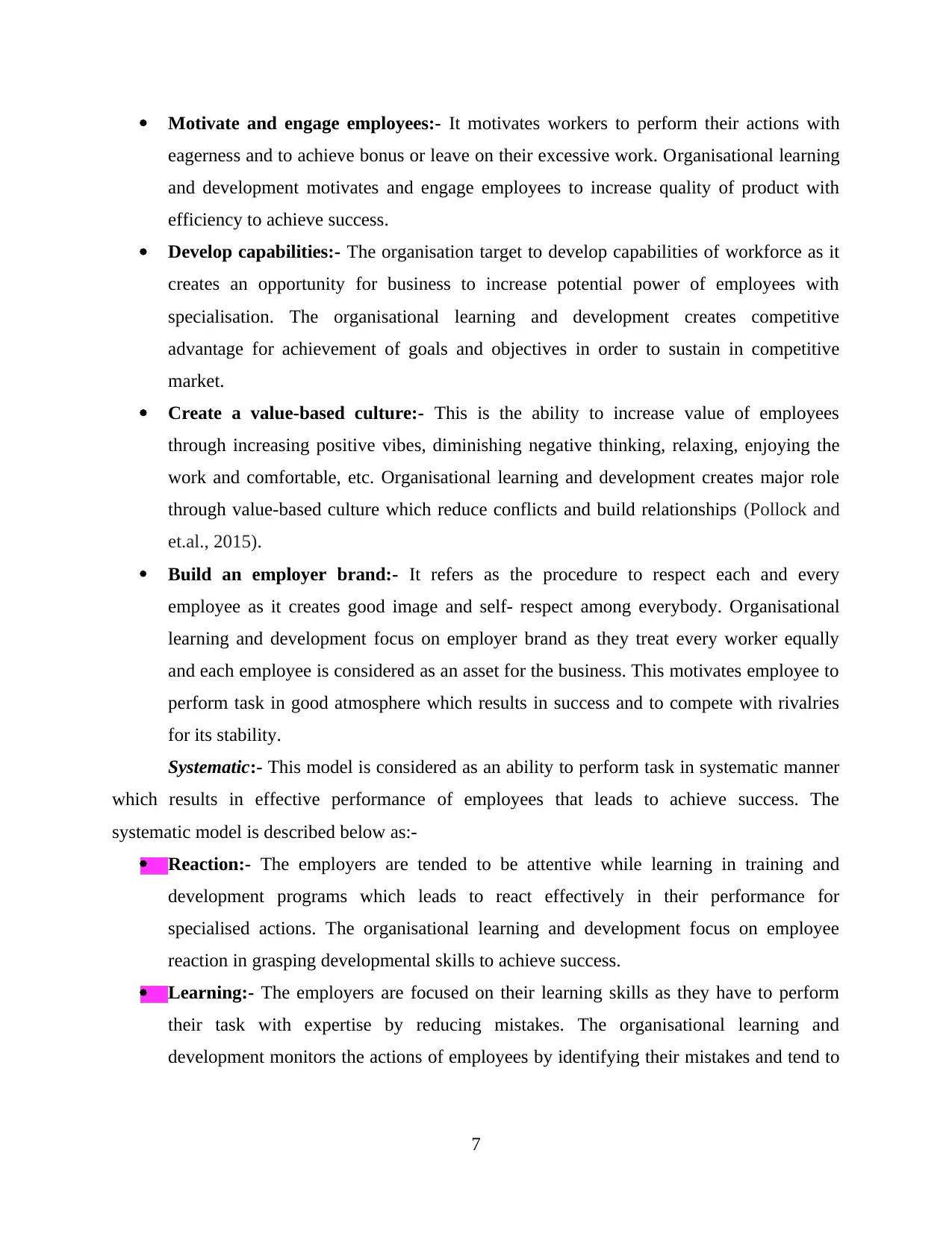
Motivate and engage employees:- It motivates workers to perform their actions with
eagerness and to achieve bonus or leave on their excessive work. Organisational learning
and development motivates and engage employees to increase quality of product with
efficiency to achieve success.
Develop capabilities:- The organisation target to develop capabilities of workforce as it
creates an opportunity for business to increase potential power of employees with
specialisation. The organisational learning and development creates competitive
advantage for achievement of goals and objectives in order to sustain in competitive
market.
Create a value-based culture:- This is the ability to increase value of employees
through increasing positive vibes, diminishing negative thinking, relaxing, enjoying the
work and comfortable, etc. Organisational learning and development creates major role
through value-based culture which reduce conflicts and build relationships (Pollock and
et.al., 2015).
Build an employer brand:- It refers as the procedure to respect each and every
employee as it creates good image and self- respect among everybody. Organisational
learning and development focus on employer brand as they treat every worker equally
and each employee is considered as an asset for the business. This motivates employee to
perform task in good atmosphere which results in success and to compete with rivalries
for its stability.
Systematic:- This model is considered as an ability to perform task in systematic manner
which results in effective performance of employees that leads to achieve success. The
systematic model is described below as:-
Reaction:- The employers are tended to be attentive while learning in training and
development programs which leads to react effectively in their performance for
specialised actions. The organisational learning and development focus on employee
reaction in grasping developmental skills to achieve success.
Learning:- The employers are focused on their learning skills as they have to perform
their task with expertise by reducing mistakes. The organisational learning and
development monitors the actions of employees by identifying their mistakes and tend to
7
eagerness and to achieve bonus or leave on their excessive work. Organisational learning
and development motivates and engage employees to increase quality of product with
efficiency to achieve success.
Develop capabilities:- The organisation target to develop capabilities of workforce as it
creates an opportunity for business to increase potential power of employees with
specialisation. The organisational learning and development creates competitive
advantage for achievement of goals and objectives in order to sustain in competitive
market.
Create a value-based culture:- This is the ability to increase value of employees
through increasing positive vibes, diminishing negative thinking, relaxing, enjoying the
work and comfortable, etc. Organisational learning and development creates major role
through value-based culture which reduce conflicts and build relationships (Pollock and
et.al., 2015).
Build an employer brand:- It refers as the procedure to respect each and every
employee as it creates good image and self- respect among everybody. Organisational
learning and development focus on employer brand as they treat every worker equally
and each employee is considered as an asset for the business. This motivates employee to
perform task in good atmosphere which results in success and to compete with rivalries
for its stability.
Systematic:- This model is considered as an ability to perform task in systematic manner
which results in effective performance of employees that leads to achieve success. The
systematic model is described below as:-
Reaction:- The employers are tended to be attentive while learning in training and
development programs which leads to react effectively in their performance for
specialised actions. The organisational learning and development focus on employee
reaction in grasping developmental skills to achieve success.
Learning:- The employers are focused on their learning skills as they have to perform
their task with expertise by reducing mistakes. The organisational learning and
development monitors the actions of employees by identifying their mistakes and tend to
7
⊘ This is a preview!⊘
Do you want full access?
Subscribe today to unlock all pages.

Trusted by 1+ million students worldwide
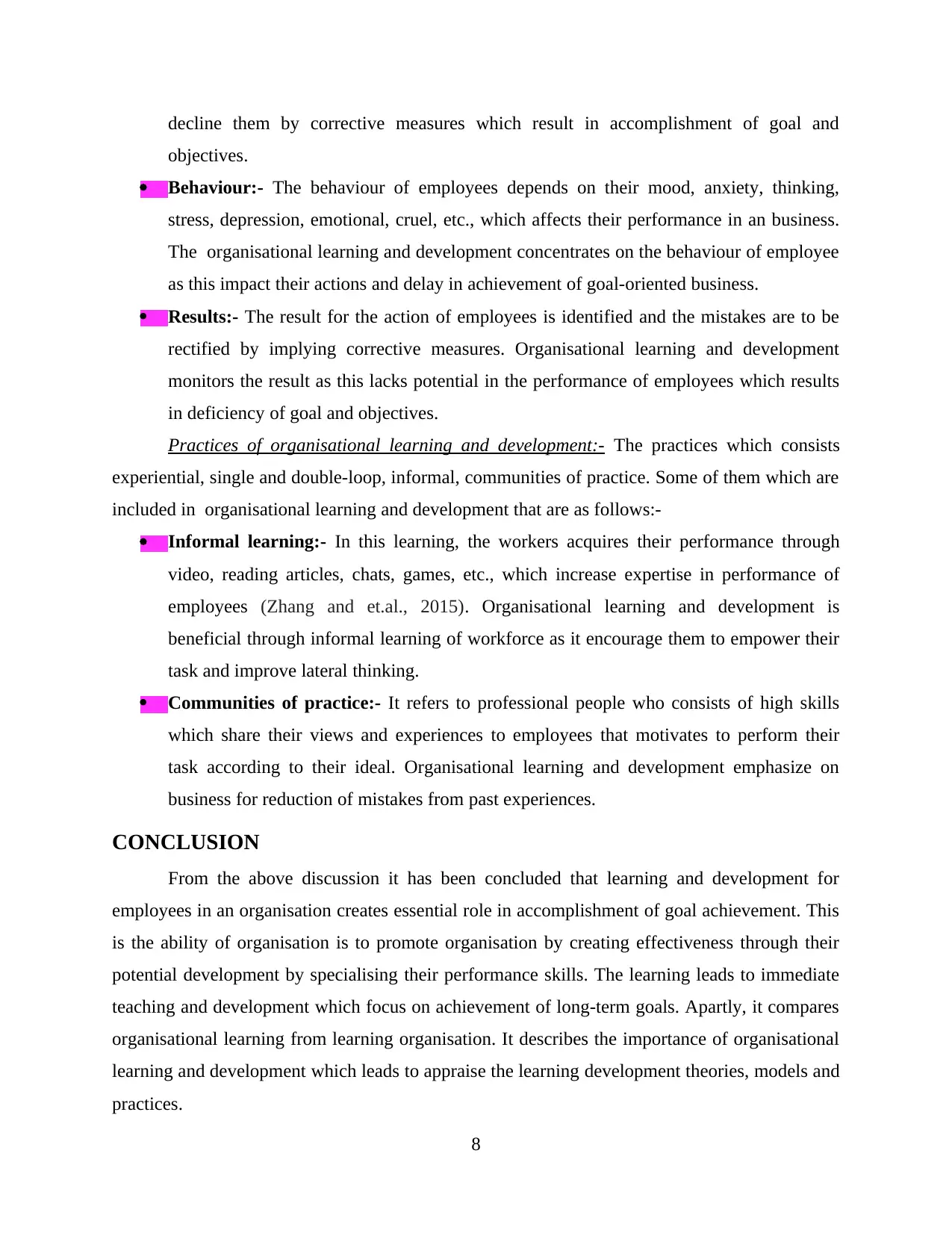
decline them by corrective measures which result in accomplishment of goal and
objectives.
Behaviour:- The behaviour of employees depends on their mood, anxiety, thinking,
stress, depression, emotional, cruel, etc., which affects their performance in an business.
The organisational learning and development concentrates on the behaviour of employee
as this impact their actions and delay in achievement of goal-oriented business.
Results:- The result for the action of employees is identified and the mistakes are to be
rectified by implying corrective measures. Organisational learning and development
monitors the result as this lacks potential in the performance of employees which results
in deficiency of goal and objectives.
Practices of organisational learning and development:- The practices which consists
experiential, single and double-loop, informal, communities of practice. Some of them which are
included in organisational learning and development that are as follows:-
Informal learning:- In this learning, the workers acquires their performance through
video, reading articles, chats, games, etc., which increase expertise in performance of
employees (Zhang and et.al., 2015). Organisational learning and development is
beneficial through informal learning of workforce as it encourage them to empower their
task and improve lateral thinking.
Communities of practice:- It refers to professional people who consists of high skills
which share their views and experiences to employees that motivates to perform their
task according to their ideal. Organisational learning and development emphasize on
business for reduction of mistakes from past experiences.
CONCLUSION
From the above discussion it has been concluded that learning and development for
employees in an organisation creates essential role in accomplishment of goal achievement. This
is the ability of organisation is to promote organisation by creating effectiveness through their
potential development by specialising their performance skills. The learning leads to immediate
teaching and development which focus on achievement of long-term goals. Apartly, it compares
organisational learning from learning organisation. It describes the importance of organisational
learning and development which leads to appraise the learning development theories, models and
practices.
8
objectives.
Behaviour:- The behaviour of employees depends on their mood, anxiety, thinking,
stress, depression, emotional, cruel, etc., which affects their performance in an business.
The organisational learning and development concentrates on the behaviour of employee
as this impact their actions and delay in achievement of goal-oriented business.
Results:- The result for the action of employees is identified and the mistakes are to be
rectified by implying corrective measures. Organisational learning and development
monitors the result as this lacks potential in the performance of employees which results
in deficiency of goal and objectives.
Practices of organisational learning and development:- The practices which consists
experiential, single and double-loop, informal, communities of practice. Some of them which are
included in organisational learning and development that are as follows:-
Informal learning:- In this learning, the workers acquires their performance through
video, reading articles, chats, games, etc., which increase expertise in performance of
employees (Zhang and et.al., 2015). Organisational learning and development is
beneficial through informal learning of workforce as it encourage them to empower their
task and improve lateral thinking.
Communities of practice:- It refers to professional people who consists of high skills
which share their views and experiences to employees that motivates to perform their
task according to their ideal. Organisational learning and development emphasize on
business for reduction of mistakes from past experiences.
CONCLUSION
From the above discussion it has been concluded that learning and development for
employees in an organisation creates essential role in accomplishment of goal achievement. This
is the ability of organisation is to promote organisation by creating effectiveness through their
potential development by specialising their performance skills. The learning leads to immediate
teaching and development which focus on achievement of long-term goals. Apartly, it compares
organisational learning from learning organisation. It describes the importance of organisational
learning and development which leads to appraise the learning development theories, models and
practices.
8
Paraphrase This Document
Need a fresh take? Get an instant paraphrase of this document with our AI Paraphraser

9
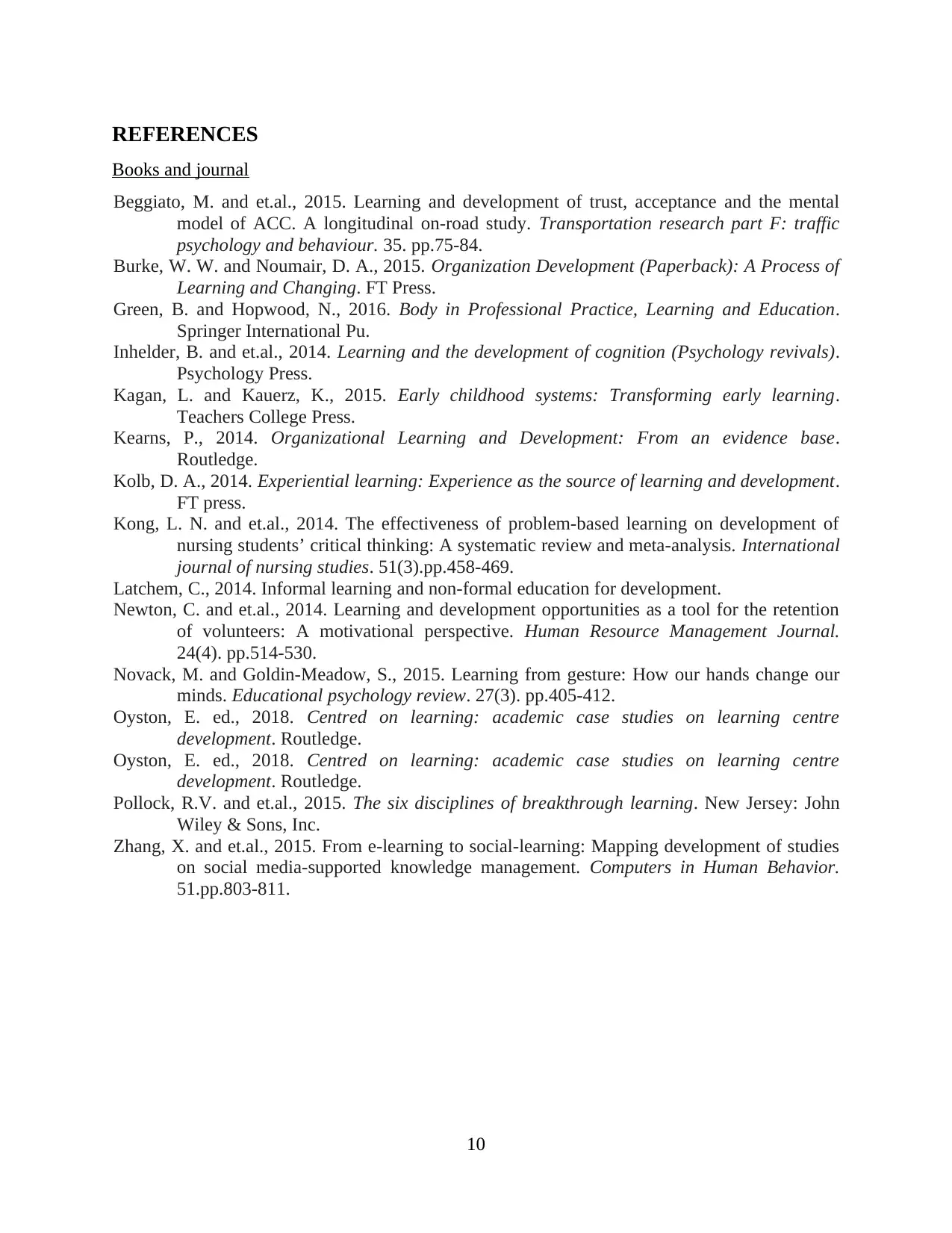
REFERENCES
Books and journal
Beggiato, M. and et.al., 2015. Learning and development of trust, acceptance and the mental
model of ACC. A longitudinal on-road study. Transportation research part F: traffic
psychology and behaviour. 35. pp.75-84.
Burke, W. W. and Noumair, D. A., 2015. Organization Development (Paperback): A Process of
Learning and Changing. FT Press.
Green, B. and Hopwood, N., 2016. Body in Professional Practice, Learning and Education.
Springer International Pu.
Inhelder, B. and et.al., 2014. Learning and the development of cognition (Psychology revivals).
Psychology Press.
Kagan, L. and Kauerz, K., 2015. Early childhood systems: Transforming early learning.
Teachers College Press.
Kearns, P., 2014. Organizational Learning and Development: From an evidence base.
Routledge.
Kolb, D. A., 2014. Experiential learning: Experience as the source of learning and development.
FT press.
Kong, L. N. and et.al., 2014. The effectiveness of problem-based learning on development of
nursing students’ critical thinking: A systematic review and meta-analysis. International
journal of nursing studies. 51(3).pp.458-469.
Latchem, C., 2014. Informal learning and non-formal education for development.
Newton, C. and et.al., 2014. Learning and development opportunities as a tool for the retention
of volunteers: A motivational perspective. Human Resource Management Journal.
24(4). pp.514-530.
Novack, M. and Goldin-Meadow, S., 2015. Learning from gesture: How our hands change our
minds. Educational psychology review. 27(3). pp.405-412.
Oyston, E. ed., 2018. Centred on learning: academic case studies on learning centre
development. Routledge.
Oyston, E. ed., 2018. Centred on learning: academic case studies on learning centre
development. Routledge.
Pollock, R.V. and et.al., 2015. The six disciplines of breakthrough learning. New Jersey: John
Wiley & Sons, Inc.
Zhang, X. and et.al., 2015. From e-learning to social-learning: Mapping development of studies
on social media-supported knowledge management. Computers in Human Behavior.
51.pp.803-811.
10
Books and journal
Beggiato, M. and et.al., 2015. Learning and development of trust, acceptance and the mental
model of ACC. A longitudinal on-road study. Transportation research part F: traffic
psychology and behaviour. 35. pp.75-84.
Burke, W. W. and Noumair, D. A., 2015. Organization Development (Paperback): A Process of
Learning and Changing. FT Press.
Green, B. and Hopwood, N., 2016. Body in Professional Practice, Learning and Education.
Springer International Pu.
Inhelder, B. and et.al., 2014. Learning and the development of cognition (Psychology revivals).
Psychology Press.
Kagan, L. and Kauerz, K., 2015. Early childhood systems: Transforming early learning.
Teachers College Press.
Kearns, P., 2014. Organizational Learning and Development: From an evidence base.
Routledge.
Kolb, D. A., 2014. Experiential learning: Experience as the source of learning and development.
FT press.
Kong, L. N. and et.al., 2014. The effectiveness of problem-based learning on development of
nursing students’ critical thinking: A systematic review and meta-analysis. International
journal of nursing studies. 51(3).pp.458-469.
Latchem, C., 2014. Informal learning and non-formal education for development.
Newton, C. and et.al., 2014. Learning and development opportunities as a tool for the retention
of volunteers: A motivational perspective. Human Resource Management Journal.
24(4). pp.514-530.
Novack, M. and Goldin-Meadow, S., 2015. Learning from gesture: How our hands change our
minds. Educational psychology review. 27(3). pp.405-412.
Oyston, E. ed., 2018. Centred on learning: academic case studies on learning centre
development. Routledge.
Oyston, E. ed., 2018. Centred on learning: academic case studies on learning centre
development. Routledge.
Pollock, R.V. and et.al., 2015. The six disciplines of breakthrough learning. New Jersey: John
Wiley & Sons, Inc.
Zhang, X. and et.al., 2015. From e-learning to social-learning: Mapping development of studies
on social media-supported knowledge management. Computers in Human Behavior.
51.pp.803-811.
10
⊘ This is a preview!⊘
Do you want full access?
Subscribe today to unlock all pages.

Trusted by 1+ million students worldwide
1 out of 12
Related Documents
Your All-in-One AI-Powered Toolkit for Academic Success.
+13062052269
info@desklib.com
Available 24*7 on WhatsApp / Email
![[object Object]](/_next/static/media/star-bottom.7253800d.svg)
Unlock your academic potential
Copyright © 2020–2026 A2Z Services. All Rights Reserved. Developed and managed by ZUCOL.




